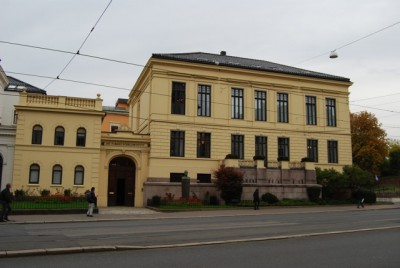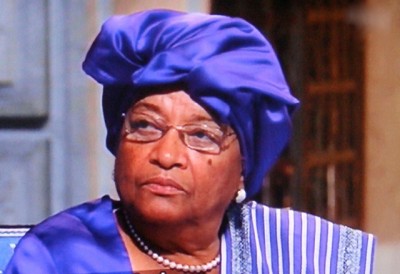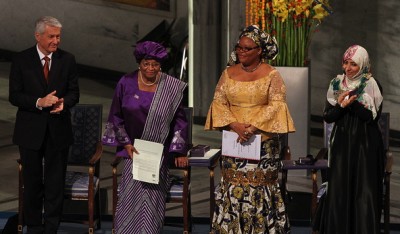The Norwegian Nobel Institute was under criticism this week, just days before the Norwegian Nobel Committee announces the winner of this year’s Nobel Peace Prize. Questions are being raised over how the committee and its staff at the institute actually screen nominees for the Peace Prize, and over the worthiness of several past winners.

Norwegian Broadcasting (NRK) devoted its investigative program Brennpunkt (Focus) to the screening issue on Tuesday night, and in doing so, cast a critical spotlight on how the Nobel Committee and institute staff operate. Their work is kept secret and no one outside the institute is privvy to their deliberations.
The committee’s choice of one of last year’s three winners, Liberian President Ellen Johnson Sirleaf, was the target of the most criticism, with several experts on Liberia saying they weren’t consulted by Nobel institute staff and suggesting she did not deserve it. They said they were surprised if not shocked that she won the prize, often viewed as the world’s most prestigious.
Sirleaf’s record scrutinized
Sirleaf herself didn’t respond to Brennpunkt’s requests for an interview, not even when Brennpunkt journalists traveled to Liberia and stayed for nearly two weeks in the hopes of speaking with her. While there, they collected more information on her political record and past support for former Liberian rebel Charles Taylor, who now is jailed in the The Netherlands for crimes against humanity.

Several people familiar with Sirleaf’s history and current work told NRK that Sirleaf played a much larger role in the gruesome war that raged in Liberia than she has admitted. Taylor’s own lawyer, Cortnay Griffiths, said Taylor told him that Sirleaf was one of three founders of his organization in the late 1980s but that because of her position in the World Bank at the time, she didn’t want a high public profile. She worked behind the scenes to secure support for Taylor and the organization and also raised funding for him, reportedly much more than she has admitted.
Sirleaf later helped deliver Taylor to the court in The Hague that convicted him, so Brennpunkt questioned the credibility of Griffiths’ and Taylor’s claims. But Jucontee Thomas Woewiyu, the third alleged founder of Taylor’s organization, said the same as did others. “Taylor had responsibiliy for the military part of the rebellion, while Miss Sirleaf was responsible for the political aspect, including the financial aspect,” Woewiyu told NRK from his home in the US. He added that “apparently the Nobel Committee was misled, or didn’t do enough research.”
‘Amazed’ she won
Others claim Sirleaf also was highly involved in the war, while some international experts on Liberia question whether her work qualified her for a Nobel Peace Prize. “I was amazed, it never entered my head she would even have been considered” for the prize, Stephen Ellis, an African scholar at the African Studies Centre in Leiden who has written several books on the Liberian war, told Brennpunkt. He’s considered one of the foremost experts on Liberia but told NRK that no one at the Nobel Institute contacted him or asked his opinions before awarding her the prize.

Ellis said that if the committee had done better research, it likely would have concluded that Sirleaf “was not really eligible for a Peace Prize.” He also said her current government is “very corrupt, maybe not her, but those around her.” Others, including senior researcher Morten Bøås at the Norwegian research organization Fafo, also questioned the committee’s screening, with Bøås claiming that “they (the committee) bought the ‘icon picture'” of Sirleaf as the first female president in Africa. When you look at the life she led before becoming president, that she hasn’t managed to distance herself from her role in the civil war, and the fact she hasn’t been the unifying leader Liberia so badly needs, I don’t think she should have won the prize.”
Many of the facts Nobel Committee Chairman Thorbjørn Jagland recited in last year’s Nobel address also were disputed in the Brennpunkt program, including an alleged reduction in rapes in Liberia, the number of girls going to school or any reduction in female genital mutilation, which Sirleaf hasn’t outlawed.
It all boosted concerns over how the committee conducts research into Nobel nominees, and not just Sirleaf. Past prizes to US President Theodore Roosevelt, former US Secretary of State Henry Kissinger, former Israeli leader Menachem Begin and former Palestinian leader Yassir Arafat were also questioned, including the prize to US President Barack Obama three years ago.
Committee secretary defensive
Geir Lundestad, secretary to the Nobel Committee and director of the Nobel Institute, dismissed the criticism and claimed its screening (for which he is responsible) is sound. “Before a person or organization gets the prize, the candidate is evaluated at least twice, perhaps three or four times,” Lundestad told Brennpunkt. Asked whether that applied to Sirleaf, he said that “in principle, it applied for all three winners we had last year.”
But only Lundestad and members of the committee know how such evaluations are conducted or which international experts are consulted. Under the terms of the Peace Prize process, their deliberations are kept secret for 50 years.
“Nothing regarding the process (of choosing the winners) can be made public,” Lundestad said. “Therefore it’s impossible for me to say which experts we used.” He wouldn’t comment on why those like Ellis and Bøås weren’t consulted, or why others in Liberia familiar with Sirleaf’s work weren’t consulted either. Nor would he say where the committee obtained the rape statistics, for example, that others claim are wrong. He referred in general only to published media reports.
Lundestad, who appeared shrill in his defense of the prize, claimed the committee knew about Sirleaf’s connections to Taylor. He conceded that awarding a prize to a national leader often stirs controversy. Otherwise, the longtime secretary to the committee held fast to its decisions without revealing the process behind them.
This year’s Nobel Peace Prize will be announced at 11am on Friday.
Views and News from Norway/Nina Berglund
Please support our news service. Readers in Norway can use our donor account. Our international readers can click on our “Donate” button:

